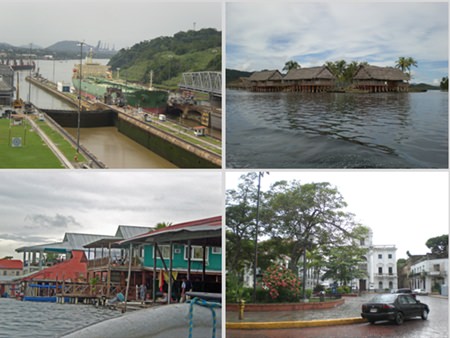Welcome to Panama, Casablanca without heroes
– The Tailor of Panama, John Le Carré (1996)
I’m told that Panama is such a beautiful country. You can drive from the exquisite shores of the Caribbean Sea to the epic Pacific Ocean coast inside an hour-and-a-half. So it seems a shame that the country has been the scene of some of history’s most infamous events: including France’s, then America’s, relentless malaria-infested push to complete the Panama Canal; and the 1989 US Army invasion, which conservative estimates claim killed 2,000-3,000 civilians and culminated in playing, amongst other rock music, Jethro Tull at ear-splitting volume to coax dictator Manuel Noriega out of refuge in the Vatican embassy in the Central American country’s capital.
Once again its name has reached infamy: this time for the Panama Papers – around 11.5 million documents leaked from a Panama-based law firm, which reveal offshore holdings of 140 politicians and public officials and more than 214,000 offshore entities, connected to people in more than 200 countries. The Prime Minister of Iceland and Spain’s Minister of Industry have already resigned, Pakistan’s PM has unexpectedly flown to London on medical grounds, while his British counterpart has, after severe scrutiny, admitted he profited from his father’s Panama offshore trust.
 Clockwise: Panama Canal, San Blas, Panama City Old Quarter, Bocas del Toro. Photos: Simon Harrow
Clockwise: Panama Canal, San Blas, Panama City Old Quarter, Bocas del Toro. Photos: Simon Harrow
With all the headlines, it would be easy to think of offshore finance as an exclusivity of the super-rich, which is shady and perhaps even illegal.
In reality, the act itself of holding money in a different country, in order to reduce liability to tax, is perfectly legal. Of course, it may become illegal if the reason for doing so itself is illegitimate; such as to defraud, illegally trade arms, attempt to bypass UN sanctions or simply evade tax liability by pretending income or assets don’t exist or belong to someone else.
Concentrating on illegal activity, however, would be to massively over-generalise a sector which plays a vital role in the global economy. Whilst the world of politics is segmented into countries, economics is truly global. Consequently, nation states and their systems are poorly suited to cross-border trade and finance. International finance centres can offer advantages such as protection against currency devaluations, restrictive practices by governments, protecting intellectual property and, of course, lower tax rates. They are not exclusive to huge multinational corporations; but offer advantages to individuals with a wide range of incomes too, whether through company pension schemes or personal savings plans.
This is where I have an issue with the ‘morality’ question. Politicians who wish to bring in more tax money, in the mistaken assumption that balancing the public balance sheet will somehow create economic prosperity,1 are attempting to make tax avoidance sound immoral. Ironically, the reason why UK Prime Minister David Cameron has found himself answering repeated questions in Parliament and the media is because he, amongst others, has successfully managed to make offshore tax avoidance schemes sound wrong. The PM himself stated in January 2013, “Tax avoidance, in these cases, of very aggressive tax avoidance schemes they are wrong and we should really persuade people not to do them.”2
The difficulty is that real life is rarely black and white. Cameron’s father, Ian Cameron, seemingly engaged Mossack Fonseca ostensibly for the legitimate purposes of operating an international investment fund in a jurisdiction where exchange and other controls wouldn’t inhibit perfectly legal stated operational aims. However, that doesn’t explain why the Blairmore fund issued bearer shares which are as difficult to justify as a nameless Swiss bank account. Worse still, there’s a very strong case to answer as to why Cameron Senior staffed Blairmore with Bahamas-backed nominees,3 possibly to pretend that its activities were conducted outside the UK, when he and presumably his son knew that not to be the case. Even more alarming in that the head of the UK tax authority was a partner at the tax buyers who advised Ian Cameron on this.4 So any white-washing of what prima facie appears to be a strong case for a criminal investigation will feel extremely tainted.
Furthermore, the entity itself is just a tool. If a kitchen knife is used as a murder weapon, it doesn’t mean that it was designed, manufactured or sold for that purpose. It only became a murder weapon in the hands of a murderer. Admittedly, Blairmore looks to me more like a revolver sold on the black market, but the apparent criminality and apparent complicity were down to Cameron Senior and Junior and not to Mossack Fonseca.5 If this seems like splitting hairs, it should be remembered that the younger Cameron has still failed to answer allegations that, without any trust or other form of structure, he avoided or evaded UK property tax6 in what seems to be a very similar manner to that for which his next-door neighbour, who worryingly sits atop the UK tax edifice, was found to be guilty.7
It’s all about butter… Part 2 follows next week.
Footnotes:
1 http://www.pattayamail.com/moneymatters/new-year-wishes-part-two-55930
2 http://www.independent.co.uk/news/uk/politics/david-cameron-panama-papers-tax-avoidance-father-offshore-investment-fund-ian-cameron-blairmore-a6974546.html
3 https://panamapapers.icij.org/20160403-panama-papers-global-overview.html
4 http://www.theguardian.com/politics/2016/apr/10/hmrc-chief-partner-law-firm-offshore-fund-cameron
5 https://panamapapers.icij.org/20160403-panama-papers-global-overview.html
6 http://www.telegraph.co.uk/news/2016/04/05/panama-papers-david-cameron-forced-to-declare-tax-affairs-amid-o/
7 http://www.independent.co.uk/news/uk/politics/george-osborne-in-expense-claim-for-paddock-8393737.html & http://www.independent.co.uk/news/uk/politics/osborne-guilty-of-overclaiming-mortgage-1875449.html
| Please Note: While every effort has been made to ensure that the information contained herein is correct, MBMG Group cannot be held responsible for any errors that may occur. The views of the contributors may not necessarily reflect the house view of MBMG Group. Views and opinions expressed herein may change with market conditions and should not be used in isolation. MBMG Group is an advisory firm that assists expatriates and locals within the South East Asia Region with services ranging from Investment Advisory, Personal Advisory, Tax Advisory, Corporate Advisory, Insurance Services, Accounting & Auditing Services, Legal Services, Estate Planning and Property Solutions. For more information: Tel: +66 2665 2536; e-mail: [email protected]; Linkedin: MBMG Group; Twitter: @MBMGIntl; Facebook: /MBMGGroup |




